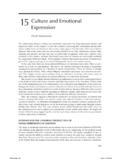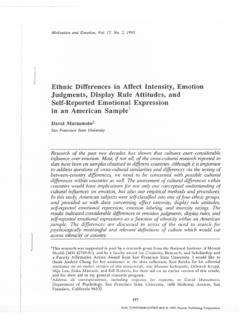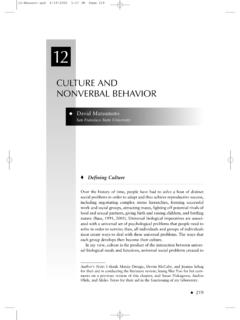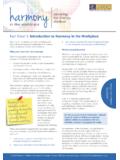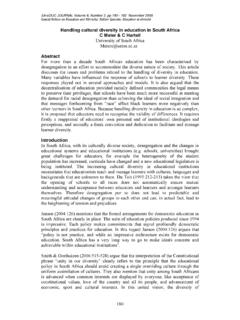Transcription of ETHICAL ISSUES IN CROSS-CULTURAL PSYCHOLOGY
1 CROSS-CULTURAL PSYCHOLOGY is the branch of PSYCHOLOGY that attemptsto test the boundaries of knowledge about human behavior bycomparing it in two or more cultures. CROSS-CULTURAL PSYCHOLOGY is aresearch method, a statement of scientific philosophy, and an attitudethat blends inquisitive critical thinking with curiosity and interest in cul-ture. As such, CROSS-CULTURAL PSYCHOLOGY can be an exciting and motivat-ing adventure; but it can also be one that presents the researcher with anumber of significant ETHICAL ISSUES and practical this chapter, we discuss some key ETHICAL ISSUES , dilemmas, andchallenges associated with conducting CROSS-CULTURAL research.
2 We orga-nize our discussion around four sections: the design of cross -culturalstudies, sampling, sensitive topics, and dealing with data and the inter-pretation of findings. Many of the ISSUES and challenges that CROSS-CULTURAL researchers are confronted with are, in actuality, quite similarto those we are faced with when conducting monocultural ETHICAL considerations that all researchers must make regardlessof whether they are conducting a multinational study involving 30countries and 50 languages or a simple study using a convenience sam-ple of American college students are somewhat universal in , we refer interested readers to the American Psychological Association scurrent guidelines on Principle Ethics ( #general)
3 , which outlines five ETHICAL principles for the conduct of ETHICAL ISSUES INCROSS- cultural PSYCHOLOGY 323 David Matsumoto and Caroline Anne Leong Jones2121-Mertens -45638:21-Mertens -45638 6/3/2008 6:34 PM Page 323324 ETHICAL ISSUES in Research Practicepsychologists: beneficence and nonmalefi-cence, fidelity and responsibility, integrity,justice, and respect for people s rights anddignity. Moreover, these ISSUES are discussedin depth elsewhere in this volume (Chapter 8,this volume). Thus, instead of reiteratingmany of the same points made elsewhere byothers, we strive to discuss here ethicalissues unique to CROSS-CULTURAL research thatmay not be covered elsewhere, all the whileacknowledging that many of the same principles and guidelines discussed else-where are applicable here as well.
4 As thereare only very few resources on this topic,we consider our work a living document,the start and definitely not the end of a dialogue, on this issue . ETHICAL ISSUES in the Design of CROSS-CULTURAL ResearchAs with all properly structured and inter-nally reliable research, ISSUES related todesign are fundamental and must be con-sidered before contact is initiated withhuman participants and data are of the biggest ETHICAL dilemmas facingcross- cultural researchers today is thepotential for the findings from their studiesto be used to vindicate powerful stereotypesabout cultural groups.
5 In our view, vindica-tion is quite different from testing the accu-racy of stereotypes. The latter involvesresearchers conscious knowledge of stereo-types and their efforts to test their validityand boundaries; presumably such consciousknowledge would also inform researchersof the need to be aware of their potentialinfluence on the process of refers to researchers ignoranceof such stereotypes, and thus their potentiallack of awareness of how these stereotypesmay affect their decisions about researchunconsciously. Thus, it is incumbent onresearchers to understand how this can bethe case, and to use research designs thatcan minimize this possibility.
6 We begin anexploration of these ISSUES by discussing thelimitations related to interpretations fromcross- cultural DANGERS OF CROSS-CULTURAL RESEARCHC ross- cultural research is comparative,that is, it requires the collection of data frommembers of two or more cultures and thecomparison of their data. One of the mostfundamental ISSUES CROSS-CULTURAL resear -chers face, therefore, concerns their opera-tionalization of culture. A perusal of theliterature would show very quickly thatthere is a great diversity in these opera-tionalizations among researchers. Many, forinstance, operationalize culture by country;others use race, ethnicity, sexual orientation,or disabilities to operationalize should be aware that theirchoice of operationalization of culture incomparative research may have importantconsequences, and may be associated withpossible ETHICAL dilemmas.
7 For example,when making decisions concerning how tooperationalize cultural groups, researchersoften believe that differences exist betweenthem (which is why they are conducting thestudy in the first place), and conduct theirstudies to demonstrate that those differ-ences actually do exist. Of course, one ofthe major goals of CROSS-CULTURAL compari-son is to examine whether or not such differences exist so that the boundaries ofknowledge can be tested and consequence of this process, however,is those very differences that are docu-mented can be used to help perpetuatestereotypes of differences by consumers ofthat research.
8 It is fairly easy, for example,to take research findings documenting differences between Americans and SouthKoreans, or European Americans andAfrican Americans, and to make statementsthat overgeneralize those findings to allmembers of those groups, essentiallypigeonholing individuals into the social cat-egories and applying those findings tothem. That is, CROSS-CULTURAL research (or21-Mertens -45638:21-Mertens -45638 6/3/2008 6:34 PM Page 324 ETHICAL ISSUES in CROSS-CULTURAL PSYCHOLOGY 325more precisely, the incorrect applicationand interpretation of CROSS-CULTURAL research)can be used to ignore the large degree ofindividual differences that exist in humanbehavior, and CROSS-CULTURAL researchers needto be aware of this potential when designingtheir instance, Iwata and Higuchi (2000)compared Japanese and Americans usingthe State-Trait Anxiety Inventory (STAI)and reported that Japanese were less likelyto report positive feelings, and more likelyto report higher state and trait anxiety, thanAmericans.
9 They wrote,In traditional Japan, a typical collectivis-tic society, individual psychological well-being is subordinate to the well-being ofthe group; that is, maintenance of socialharmony is one of the most importantvalues (Iwata et al., 1994). The healthycollectivist self is characterized by com-pliance, nurturance, interdependence,and inhibited hedonism (P. J. Watson,Sherbak, & Morris, 1998). The inhibi-tion of positive affect seems to representa moral distinction and reflect sociallydesirable behavior in Japan (Iwata et al.,1995). For this reason, the Japanese aretaught from childhood to understatetheir own virtues and avoid behavingassertively (Iwata et al.)
10 , 1994). Becauseof this socialization, the Japanese seemless likely to generate positive feelingsand more likely to inhibit the expressionof positive feelings[italics added].(Iwata& Higuchi, 2000, p. 58)Unfortunately, there are many assump-tions that underlie this interpretation of thedata, none of which were empirically linkedto the differences. These include the ideasthat (a) Japan is a collectivistic society; (b) individual psychological well-being issubordinate to the well-being of the group;(c) maintenance of social harmony is one ofthe most important values; (d) Japaneseselves are characterized by compliance, nur-turance, interdependence, and inhibitedhedonism; (e) the inhibition of positiveaffect represents a moral distinction and issocially desirable; (f) the Japanese underes-timate their own virtues; and (g) theJapanese avoid behaving assertively.
